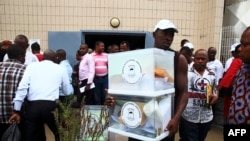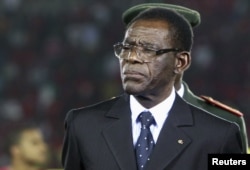Citizens of Equatorial Guinea go to the polls on Sunday to choose a new president. It is expected that long time President Teodoro Obiang Nguema Mbasogo will win re-election.
Exiled opposition leaders say Sunday’s general election is unlikely to be free fair or transparent. President Mbasogo has ruled Equatorial Guinea for nearly 37 years after overthrowing his uncle Francisco Macías Nguema.
Mbasogo is currently the longest serving African head of state and could serve another seven years in office if he wins the vote Sunday.
In an interview with VOA, John Bennett, a former US Ambassador to Equatorial Guinea says Sunday’s vote will not be credible.
“These are not elections in any meaningful fashion as to selection of a country’s leader in the West, United States or virtually anywhere else. This is the re-imposition of dictatorship that existed since the late 1960s, specifically since August 3 1979,” said Bennett.
Human rights issues
Opposition and international civil society groups have often accused the government in Malabo of gross human rights violations and the use of state security agencies to harass and intimidate opponents — accusations the government sharply denies.
Supporters of the government say Mbasogo has led the country’s economic transformation and has ensured peace and stability despite repeated criticisms. They also said accusations of human rights violations are inconsistent after accusing outside groups of plotting to create tension and seeking a regime change through violence. The supporters say it is clear the opposition can’t win the presidential vote so they are coming up with excuses to tarnish the credibility of the poll.
Exiled opposition leader Severo Moto, of the Progress Party told VOA he has been prevented from participating in Sunday’s vote because the government uses a constitutional provision that demands a candidate lives in the country continuously for five years to be eligible. That, he says, effectively guarantees incumbent President Mbasogo win the vote with a wide margin.
Motto also said the president tightly controls everything from organizing the elections, to the control of the media as well as the entire government machinery. Supporters of the administration deny the allegations as without merit.
No significant challenge
Ambassador Bennett says there is no credible opposition leader to pose a significant challenge to Mbasogo in the poll.
“If there are individuals and groups who have opposed him for many years, decades, however he has managed to neutralize them put them in jail or otherwise discouraged them, he has co-opted many, but there is no meaningful opposition in a sense that he would allow an opposition party to oppose him. No,” said Bennett.
Asked why the international community has yet to take action against the government in Malabo, despite repeated reports of human rights violations, Bennett said “Sadly to a great extent it has been a get along go along international community that one, needs the oil and also for example with respect to the United States, the oil companies facilitated very powerful very effective press campaign through professional image managers so that he was acceptable enough to come and go as he wished.”









